Today's guest for our interview is an artist and tattooist whose creativity has become a symbol of innovation and experimentation in the industry. A member of the professional team Radiant Ink and a multiple-time winner of international tattoo conventions, Vadim Skorik, widely known by the pseudonym BA CK, will share with us his journey in art, inspiration, and approach to creating unique tattoos.
Vadim, hello! Let's start with traditional questions: how did you become a tattoo master? Where are you from and where do you work now?
- Hello to all readers, I hope this can distract a little from what's happening around. In 2013, in a small town in the north of Russia called Arkhangelsk, I worked in a bank, issuing loans. The essence of the work was to make people's already difficult lives even harder by giving them a loan to buy a microwave, for example. Add some expensive insurance, and so on. After about six months, I morally couldn't handle it properly anymore, and there were no destructive inclinations, so every day after work, I sat down and drew.

Drawing has been with me since childhood; it's one of the few processes where time truly disappears along with the whole world and its problems, no matter how banal that may sound. It worked for me as therapy and worked excellently! Over time, I accumulated a decent number of interesting pictures and created a group on social networks where I regularly posted them with interesting captions and audio recordings to set the mood. After a while, friends started sending me photos of people with tattoos based on my drawings, and I thought, "What the hell!" I consulted with some tattoo artist acquaintances and bought my first setup. Artificial skin. The first on skin - on myself. Then on friends, friends of friends, and so on, following an established pattern.
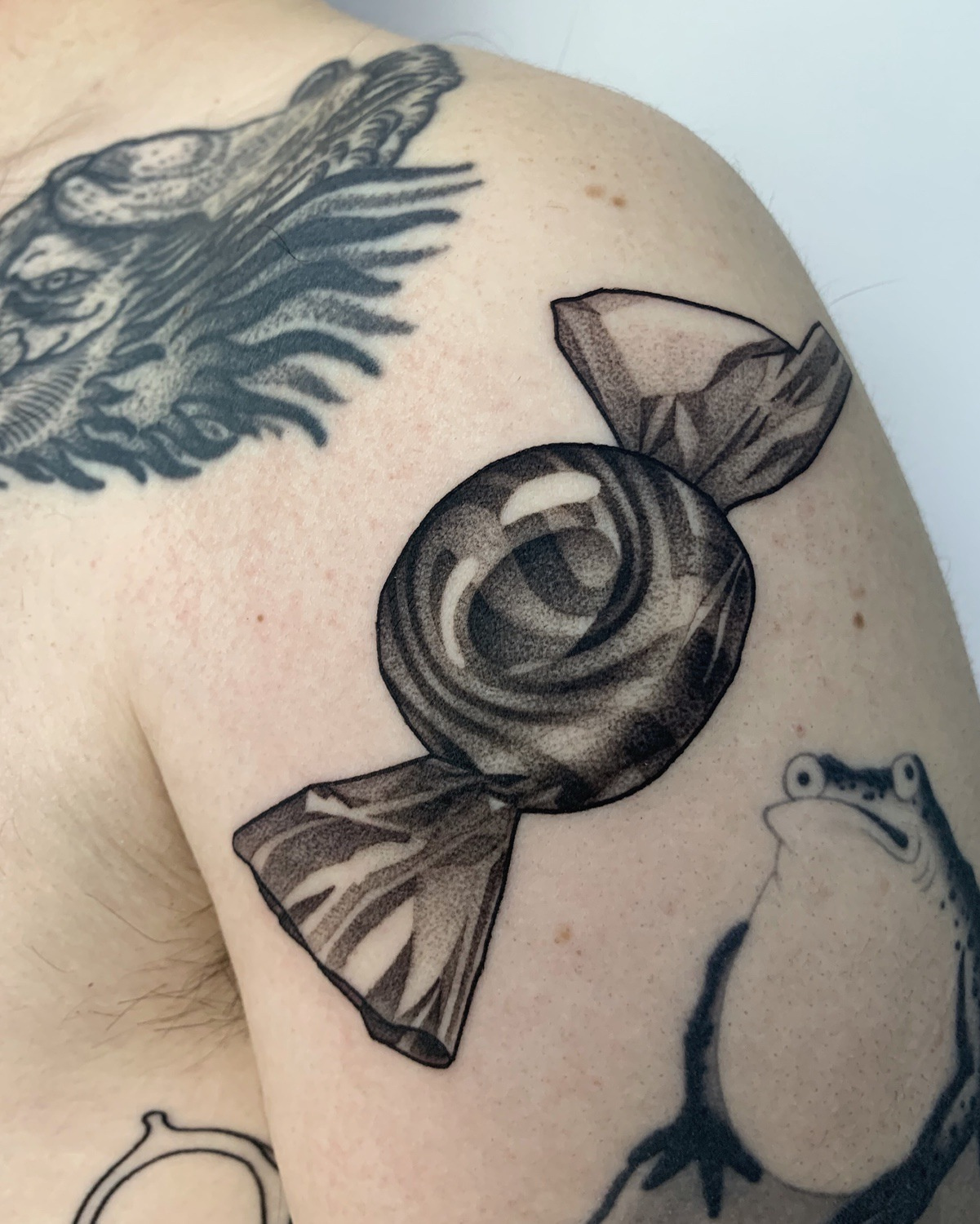
Do you have any artistic background?
- Since childhood. 11 years of secondary school with an artistic bias, 3 years of art school, and then 2 years of Computer Graphics at the IT lyceum. And simultaneously, I was constantly drawing something during boring classes and at home when there was nothing else to do. So, there was always something to do. I had thoughts about getting a higher art education, but I felt ready to start acting already, plus I decided not to build any strict systems in myself regarding this matter.
You have a very interesting and original style! During the preparation for this interview, we identified about 4 tattoo directions that you use as the basis for your work. But first of all, let's talk about your tattoos resembling ink spills. Tell us about the stages of forming your style? What or who inspired you? How do you define your style?
- Liquid forms in this form came to my mind back in early 2019 when I first posted sketches with this style. You can check it out on Instagram. I'll never forget the feeling that I did something interesting. Now it's quite a popular gimmick and used by many, but back then, it was understood by few. I had to make quite an effort to start implementing these ideas on people. First of all, other tattoo artists appreciated the style and wanted it for themselves. Among them were guys with quite a large audience, and that's how it slowly started to flow.

I vividly remember when this idea came to me. I saw someone's Japanese full body project, which consisted only of one element - Japanese air. That is, essentially, everything "superfluous" is removed, and the background becomes an independent element - brilliant! It was then that I realized for myself that the object could be the absence of an object, air, abstraction. I started to give this form to simple familiar objects - triangles, spheres, etc. Then the form gradually became more complex, plus other tattoo artists started to apply this gimmick in their own way, which further expanded the possibilities of these forms.

In addition to technique, you also have impressive designs! Tell us, how do your projects come to life? What comes first: your idea or the client's idea?
- Thank you! I love all my clients with all my heart for their openness to new things and total trust! Very often people come with a request for "something cool in your style on the neck, arm, etc." A large part of my portfolio is made exactly in this way!
Clients with more specific requests are also quite common, and together we create a project that both of us are excited about. Dialogue in such an approach is the only thing that can lead us to a truly interesting project, and I'm as interested in it as the client, so I don't charge any money for consultations at all. Come, let's talk, I'll be glad. Because I also want to do something impressive!
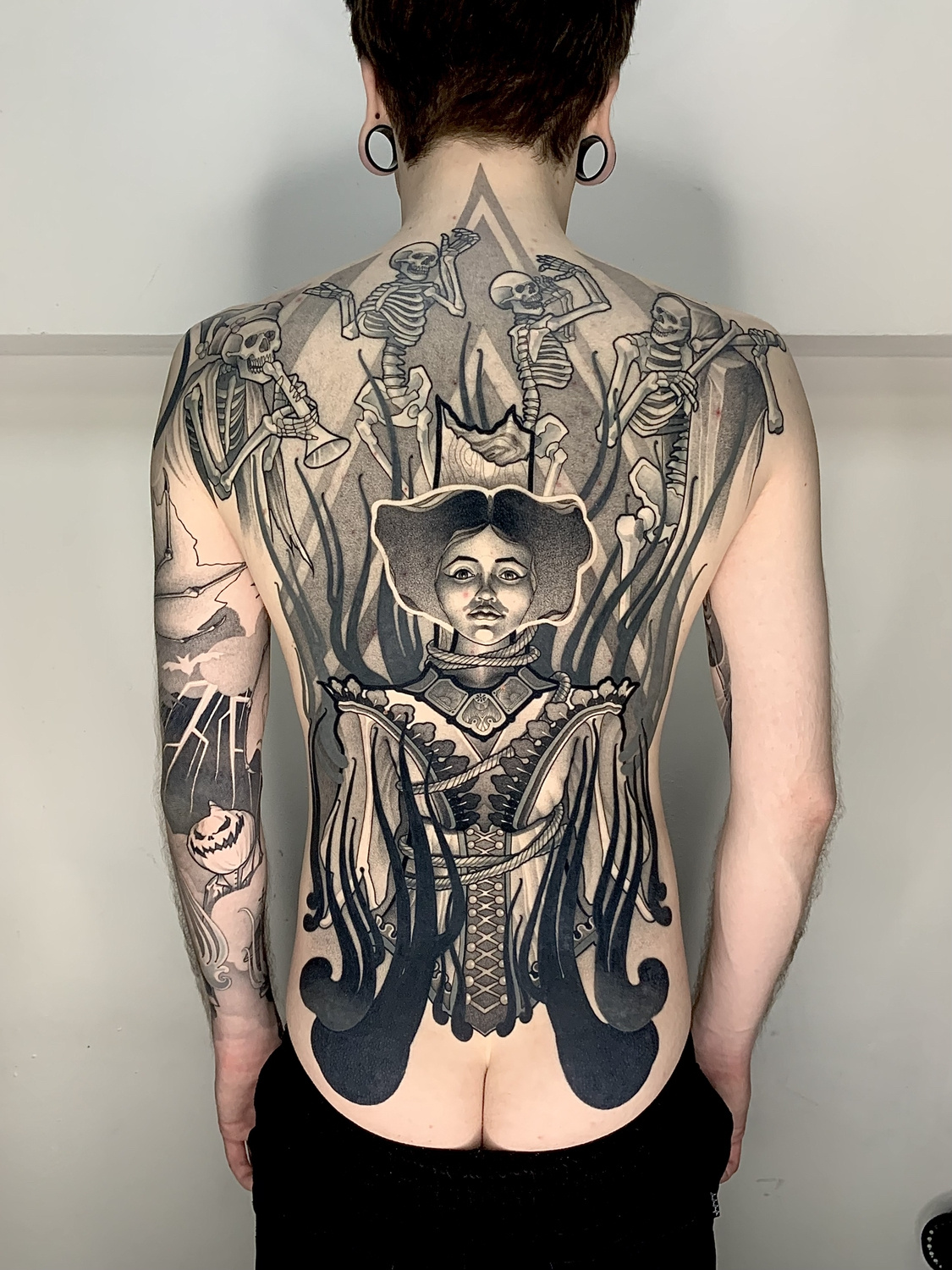
From a creation standpoint, it's all very relative. It can be very different, in different moods and circumstances, but what unites it all is one very important moment - you have to start.
You're not afraid to experiment not only with styles but also with materials. We've seen your work with a needle on paper, very impressive! What other experiments have you had in your career?
- Oh, absolutely. As I've mentioned before, I've decided not to confine myself to any strict systems regarding this matter, so I'm not afraid to use unconventional tools at first glance. From branding irons on leather, pastels on skateboards, fingerprints, needles on paper, and so on. It's like there's nothing particularly special about it, but for some reason, it hasn't been widely applied and is often met with genuine surprise. I hadn't thought about it until this question, by the way. I should continue these experiments.

Tell us about your most memorable project in your career.
- Over 11 years, I've worked in almost all areas on the body in various styles and scales, so it's impossible to highlight just one thing. And honestly, I don't want to. But one moment I still remember (laughs). It was a fairly simple job and for some, maybe even tacky, but I still remember it - a wave that I drew in one stroke of the hand and also pierced in one motion, wiping it once with a napkin. The manager assembled and disassembled the station, so the whole session lasted less than 2 minutes for me. I thought then, "I'm definitely cool" (laughs). I was often amazed by the projects we created with clients, understand me correctly, but in such a situation, it happened only once (laughs).
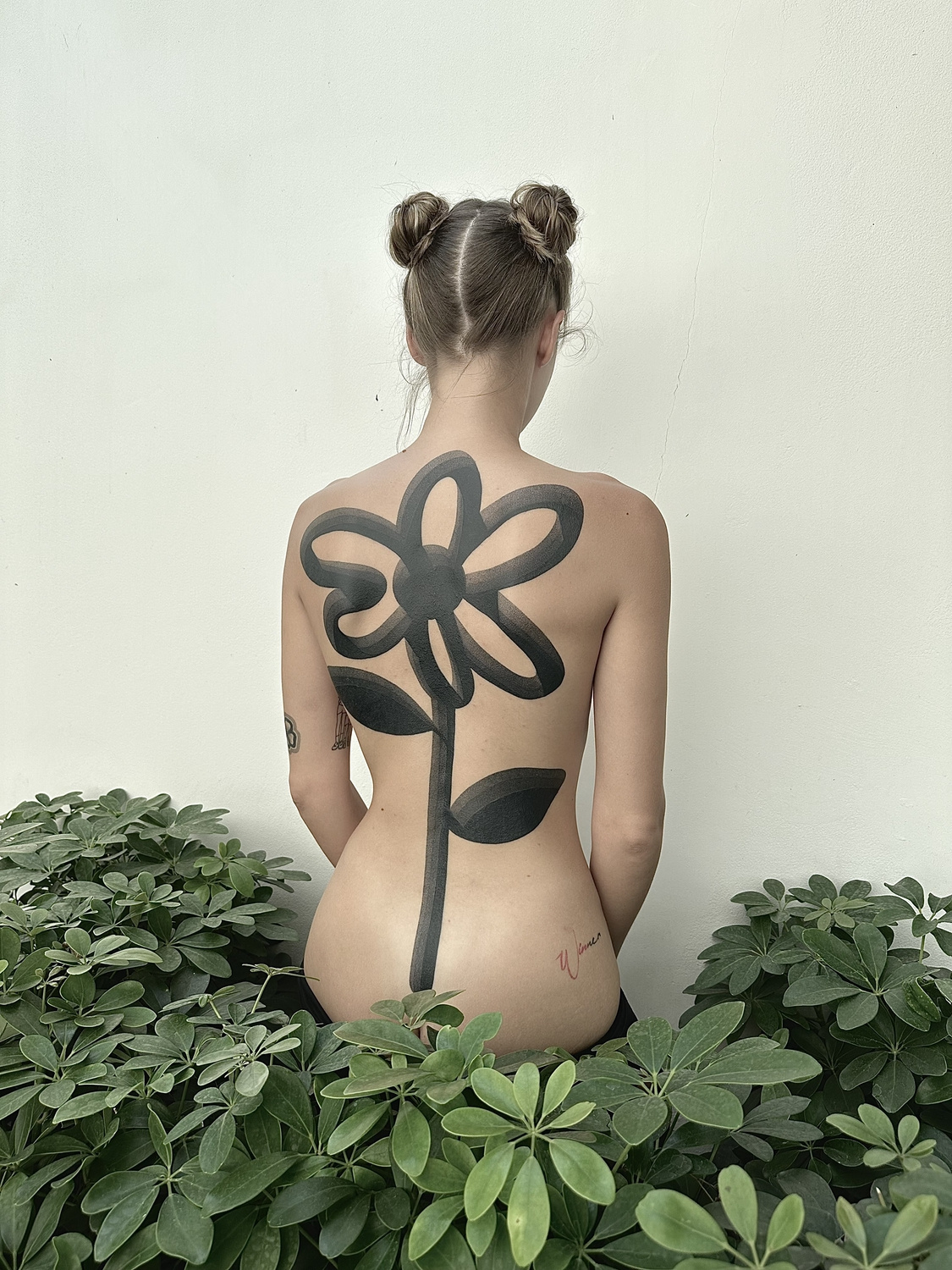
And as for something impressive, I think the project I'm currently drawing with a needle on paper is. It's kind of a "demonstration performance" where I showcase my level at this stage. It's a collaboration with a good friend, and soon we'll gladly share it! We're both excited about how it's turning out, and we're even a little proud already. Right now we're about 70% there. So, very soon.
Do you travel a lot? Do new places influence your creativity?
- Yes, I've been actively traveling since around 2019. And I think if it weren't for traveling, I'd be a completely different person. I probably wouldn't have stumbled upon that Japanese full-body from thin air, probably wouldn't be collaborating now with a tattoo artist from the other side of the planet, whom I was following, and didn't even dream of just meeting, etc. I'm sure that traveling is one of the most important details of development, regardless of profession, just humanly.

In your view, does the attitude towards tattoos differ among residents of these countries? And if so, how? Where do you feel most comfortable working?
- When you start traveling a lot, you realize that there's no right or wrong. Somewhere they love traditional style, somewhere geometry, somewhere fine line is the pinnacle of skill, and somewhere anything other than realism is amateurish and lacking skill. It's the same everywhere and in absolutely any field. The question is how you're going to handle it. Can you interest people with your vision so that they want to wear it for life? Reframe their idea in such a way that the person sees the opportunity to make it even better than they imagined. And let's be honest, this doesn't always happen (laughs). And that's okay. But when it does, it overshadows everything. It's a victory, and it's your day!
But the more you appear in the same spot, the larger a community of loyal clients gathers around you.

More and more often, discussions arise in the tattoo community about the differences between a tattoo artist and a tattoo master, tattoo culture and tattoo industry. How do you understand these concepts? And in your opinion, what are the differences between them?
- Cool. I love discussing this! For me, the differences are already in the definitions themselves. A tattoo master is a person who technically knows how to make tattoos of quite good quality without claiming uniqueness. Without obvious ambitions in the development of the art world. They are here to earn good money and have a good time. This is the tattoo industry.
There are a lot of such masters now, and that's a plus. The market is growing, the entry threshold for clients is simpler and cheaper, and the quality level of market consumables and equipment is simply top-notch. This is largely thanks to the industry. Plus, they take all those clients whom most artists don't want to work with, like the sanitation workers of the forest in that sense.
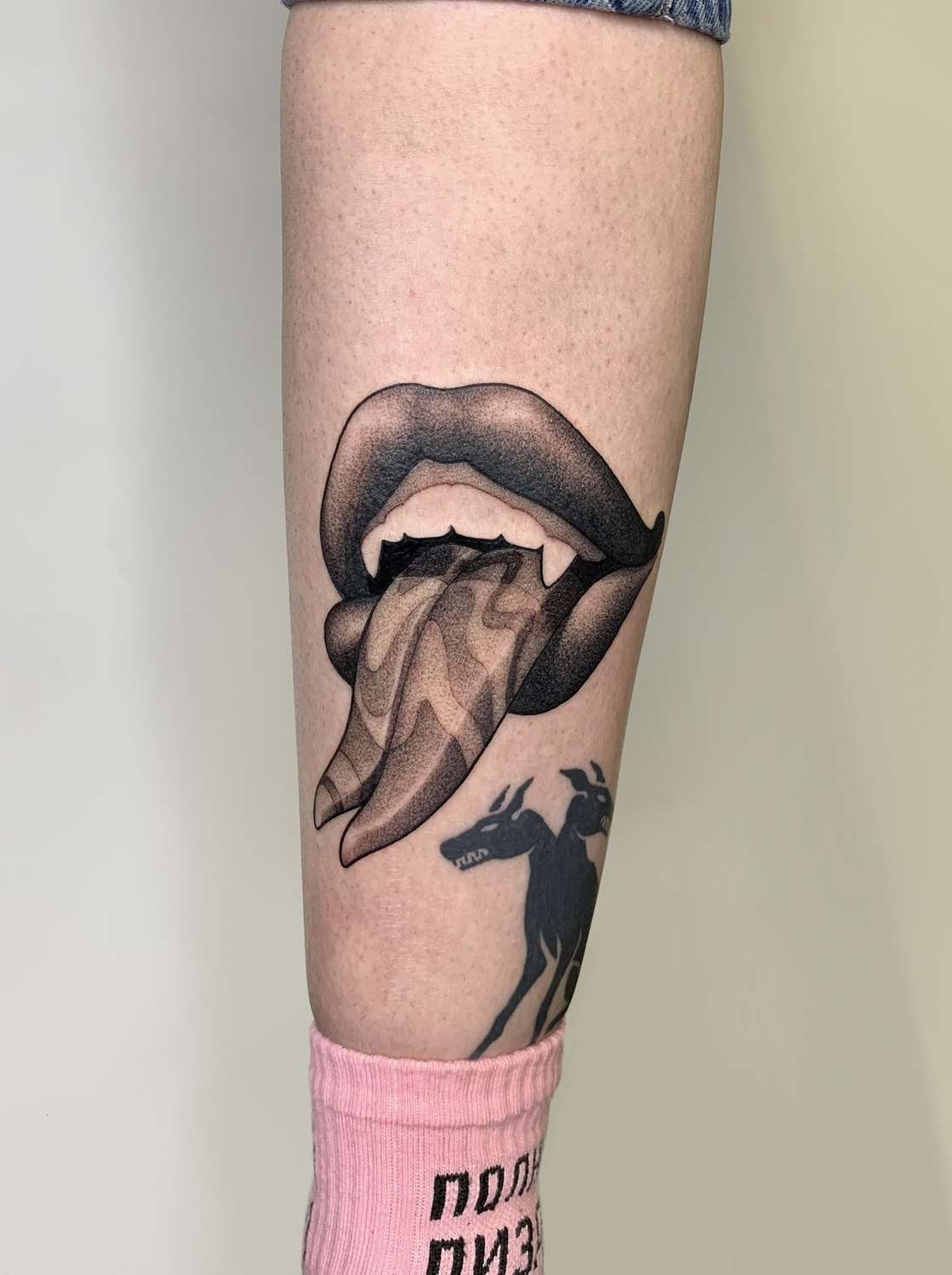
A tattoo artist is a person who itches and stops itching only when they create something, come up with something. On paper, tablet, skin - it doesn't matter. And if they manage to create something truly amazing - fantastic! If not - no big deal, they will still continue because that's their real world. Most likely, they started with some style and maybe even changed it a couple of times, as learning is eternal. This, in very simple terms, is tattoo culture. What the industry is based on. What the industry or market was created to support. We can't survive without each other, so we need to stick together! Like yin and yang (laughs). And just as there are no one hundred percent extroverts or introverts, we are all artists and masters to some extent.
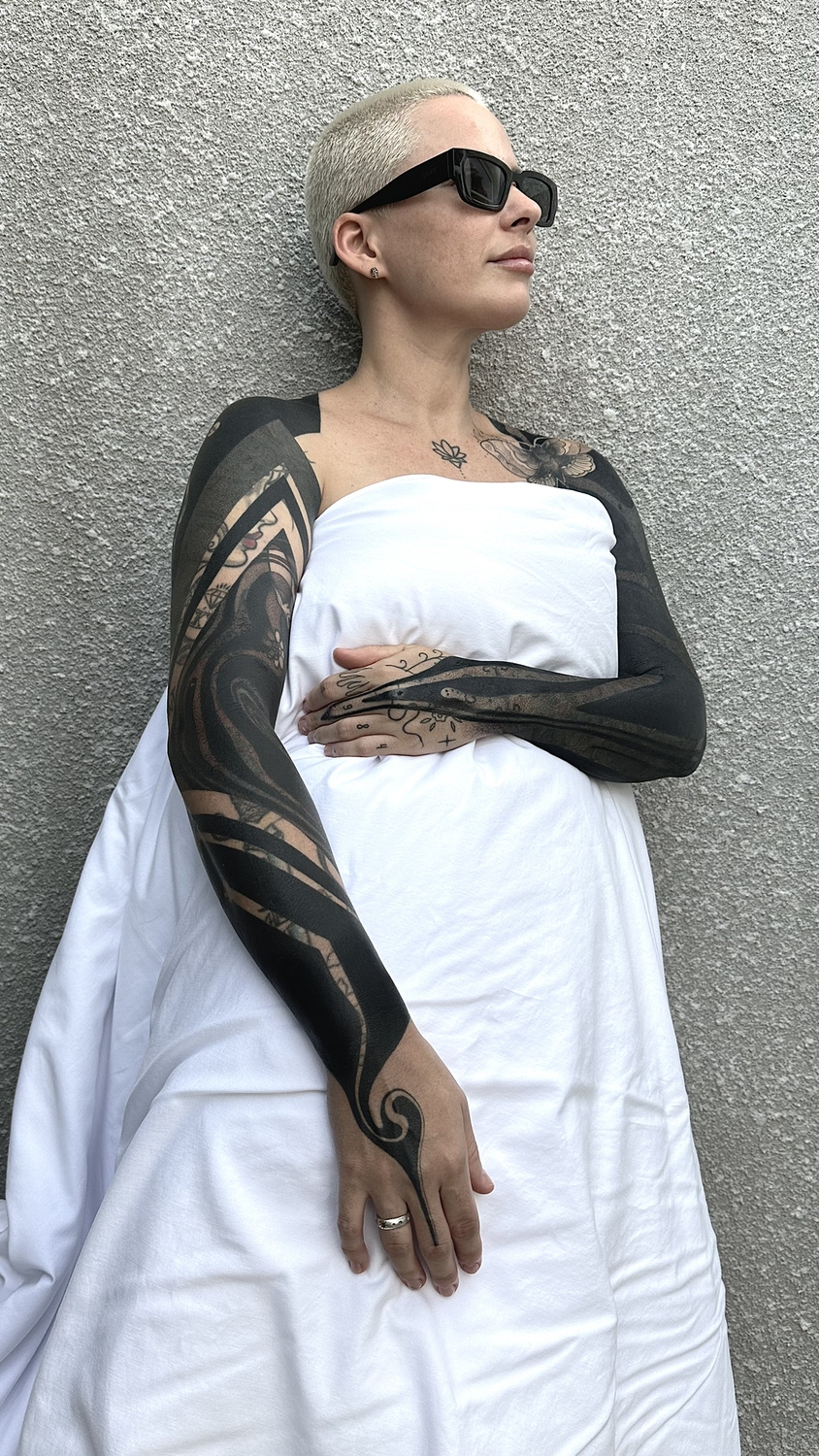
How does the public perception of tattoos influence the social recognition and prestige of tattoo artists?
- Judging by the number of countries in the world where the profession of a tattoo artist is officially regulated and included in government registries, things are not going well. Which for me raises a big question "WHY?!". The tattoo artist is one of the oldest professions. It appeared long before lawyers, narrowly specialized doctors, managers of any level, etc. You can list for a very long time. For most of human history, this profession was a calling, and not everyone could do it; this title had to be earned. Being a tattoo artist was honorable and equated to spiritual supremacy.
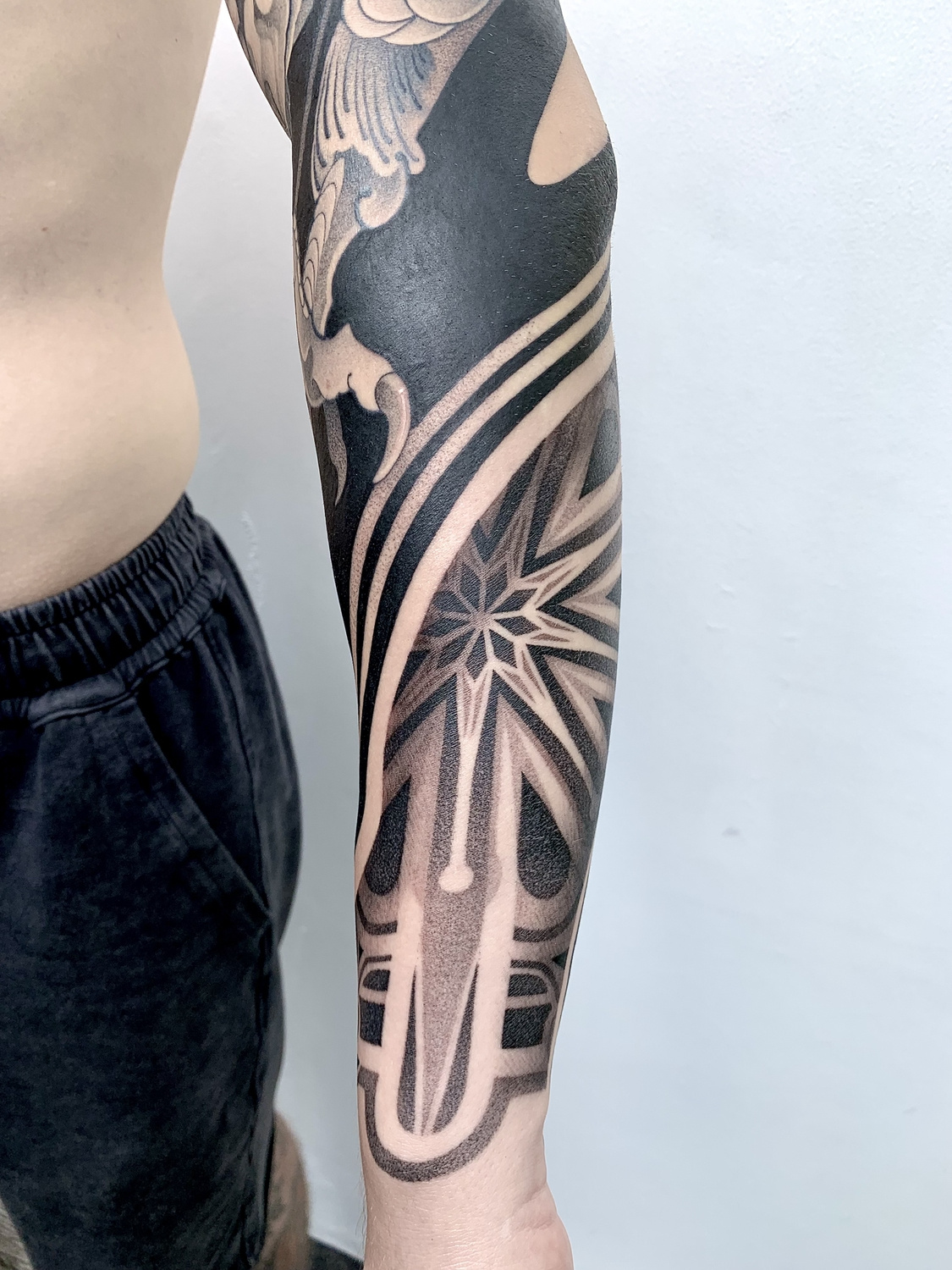
All over the earth, in all cultures. It was a sacred and profound process through which a person moved to the next stage of their life. Of course, with the advent of mass market, a significant part of the culture ceased to be relevant in the modern world, but this is such a massive and ancient tree with an immense trunk and lush crown, with roots spreading all over the planet to the same depth as writing and languages, that the only thing that threatens it is modification over time. And this is in our hands.
Not many people realize this. And I would like to influence the attitude towards the profession of a tattoo artist both in people's minds and at the state level. It is quite immature to judge the culture as a whole by a couple of marginal weirdos from the yard. We are deep, educated, modern people who respect traditions. We are extremely hardworking and responsible. We are an important part of society, deserving of the same benefits, rights, and social protection as other specialists in their field, and are ready to bear the same responsibility. So if there are people among you who share these views - write, join - together we have more chances.

What future do you see for the world of tattooing in the next decade?
- I see the changes as significant. The emergence of artificial intelligence will make its adjustments. Like everything else in this interview, this is solely my subjective opinion, but for culture as a whole, it will be more of a plus. AI will most likely push out the "average" players from the market, for whom using other people's sketches and the concept of "correction" are absolutely normal occurrences, thus securing a strong position in the industry. This, in turn, will further solidify and highlight the position of culture and artists. There will remain those who are capable of creating, those who are the source.
You can't kill the roots of a tree by cutting its trunk. New growth will emerge - different.

Do you participate in conventions? Share your experience and results. How important is it for a modern tattoo artist to participate or at least attend such events?
- Of course. Conventions are one of the most important components in the development of a tattoo artist/master. I have won both first and second places in various categories, but I don't take it seriously because I don't consider the competitive aspect of conventions decisive or even somewhat objective. The same work can take either first place or no place at all depending on the judges' table.
I don't really understand the fact of evaluating such things myself, maybe that's why. There are too many contradictions related to publicity, acquaintances, and so on. But from the perspective of sharing experiences, finding new solutions, inspiration, like-minded people, and so on down the long list, it's an invaluable event, essential to attend if you have the desire to become more than you are now. But I'd sit on the jury (laughs), it would be interesting to see how I'd do. Perhaps it would change my attitude.
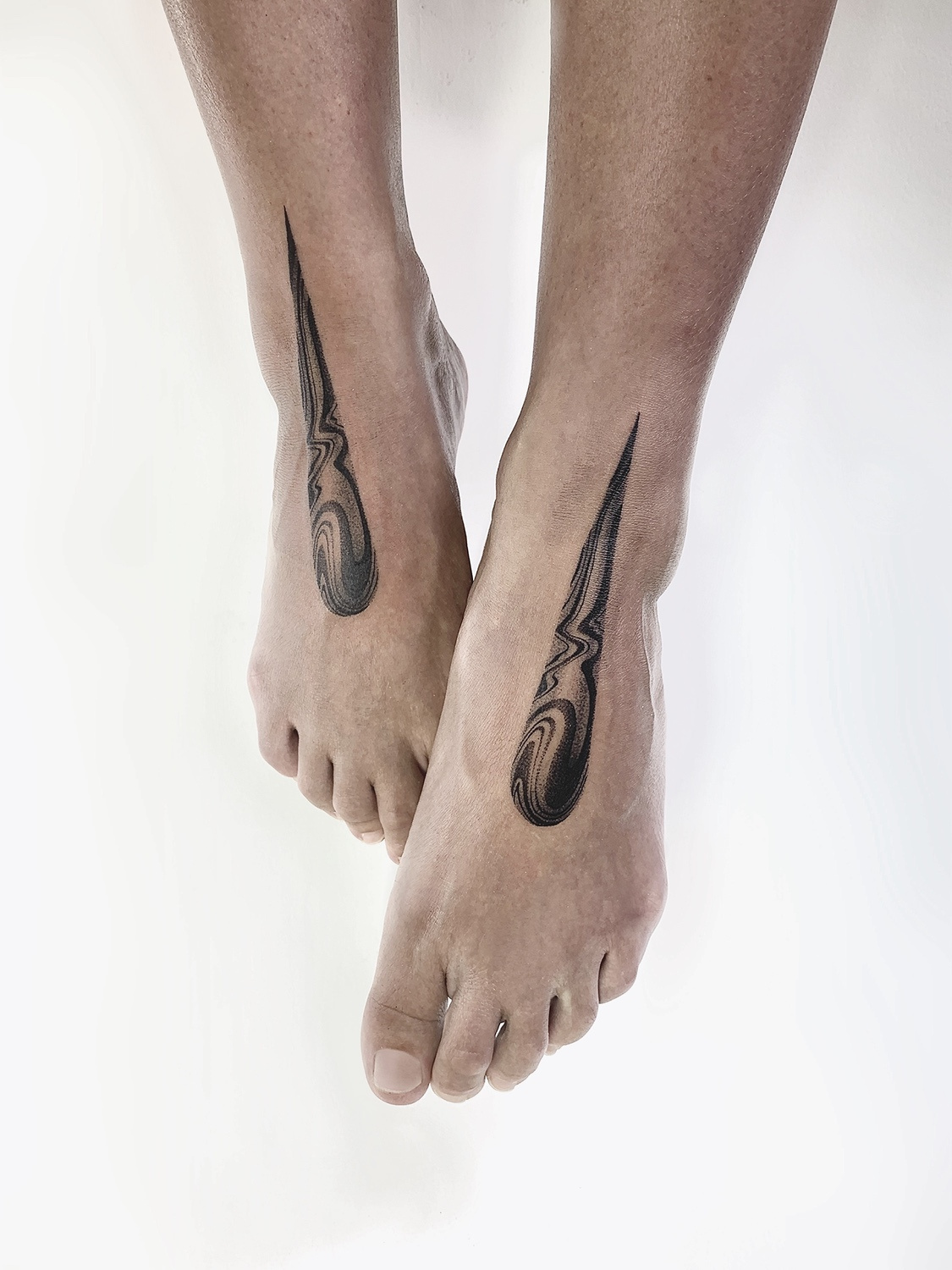
You are a member of the Pro Team of one of the world's most famous paint manufacturers. What other Pro Teams are you a part of? Tell us what this membership gives you and whether you manage to influence the development of this tattoo industry sector?
- Any adequate sponsorship is equally beneficial to both parties. For the artist, it provides the opportunity to become part of a strong team, make a name for themselves within the industry, get acquainted with products that can improve the quality and comfort level of their work process. It also provides the opportunity to change a particular product, make something more convenient, or even revolutionary.
For manufacturers, it's a chance to make a mark in the competitive market through strong artists, make the brand more recognizable, expand product distribution to a larger territory, increase the value of their products, make changes while listening to experienced artists, and make a particular product even better, thus surpassing competitors and so on. It's hard to assess personal influence on the industry. It's more about the awareness of the Pro Team as a whole. If your goal in joining the Pro Team is solely to get free supplies, then what kind of influence can we talk about?
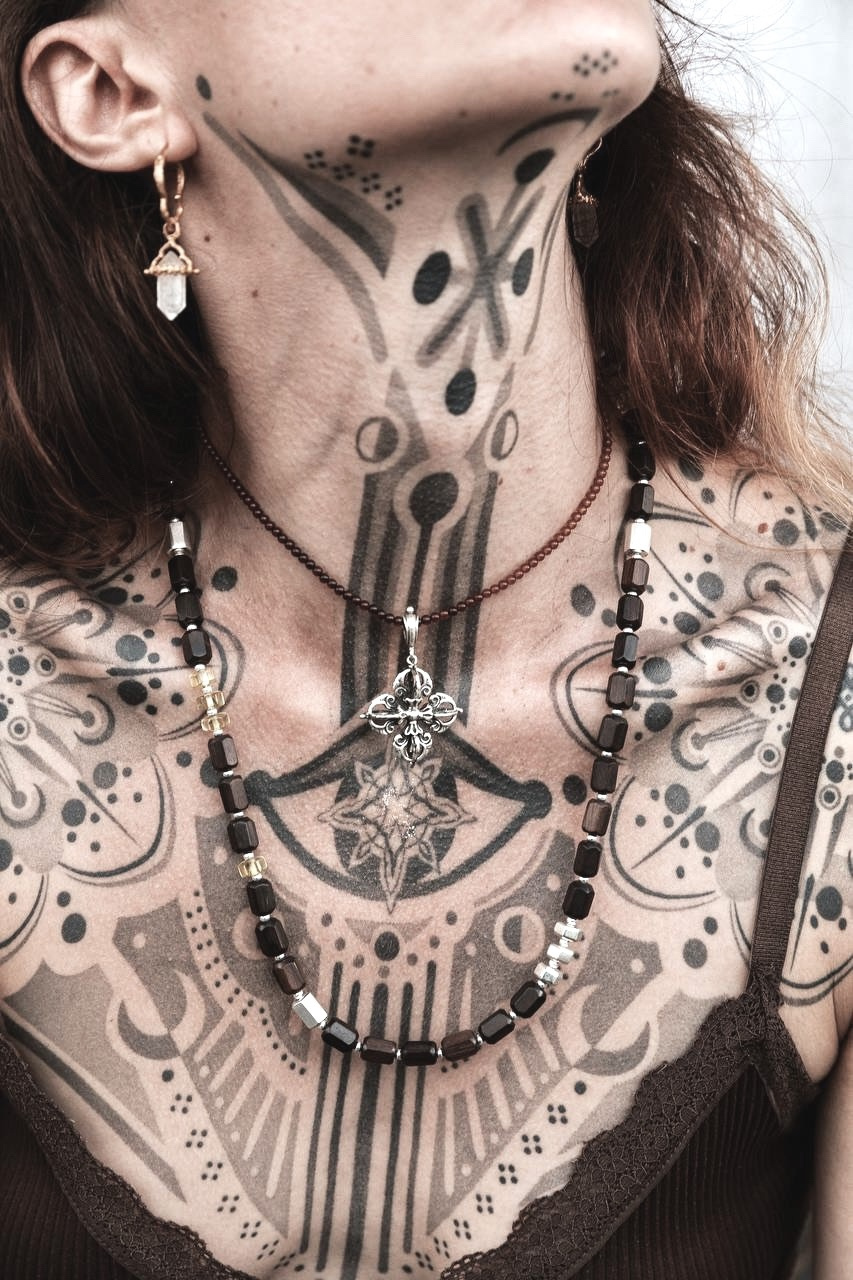
What is the main goal of your journey? Share your plans for the future.
- My main goal is not to stray from the path. Sometimes I lose focus and pay more attention than necessary to what I can get rather than what I can contribute. So the main plan is not to lose this balance, which in turn will allow me to gather like-minded people around me and influence the industry and culture in general towards their development. And in personal terms, it's to continue self-expression, to find more and more new tools and ways of self-expression, and to lose as many unnecessary boundaries along the way as possible. Grow as a creative unit and as part of the community. Thank you for the opportunity to share my thoughts and become more understandable to you!
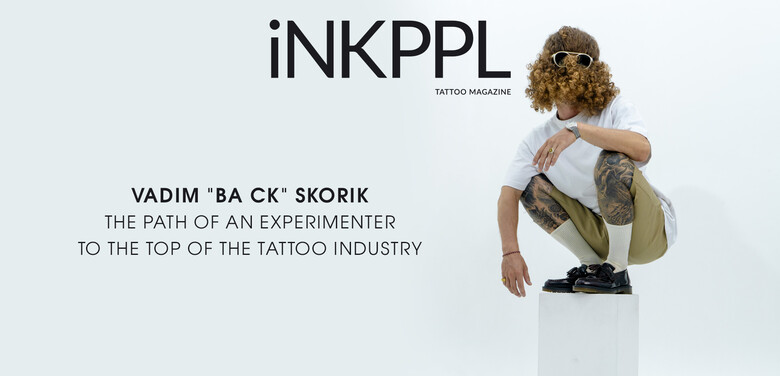


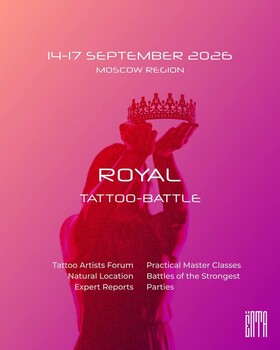
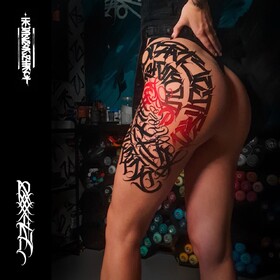
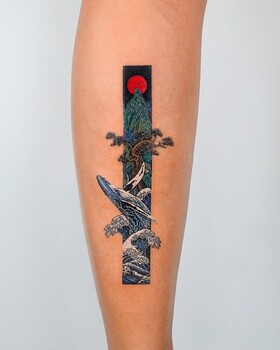
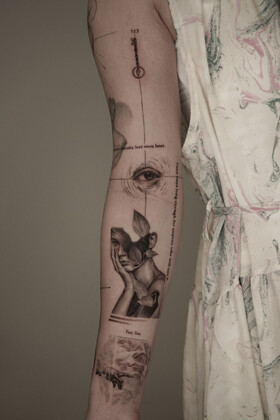
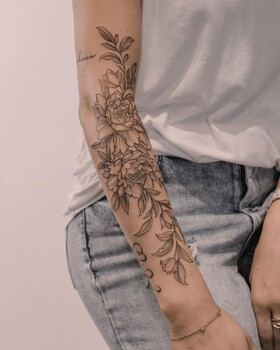
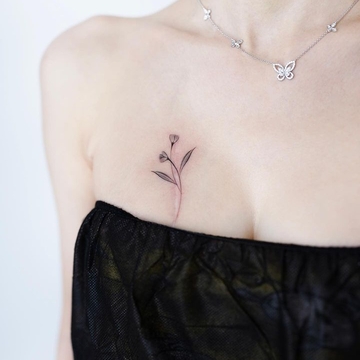
Comments (0)